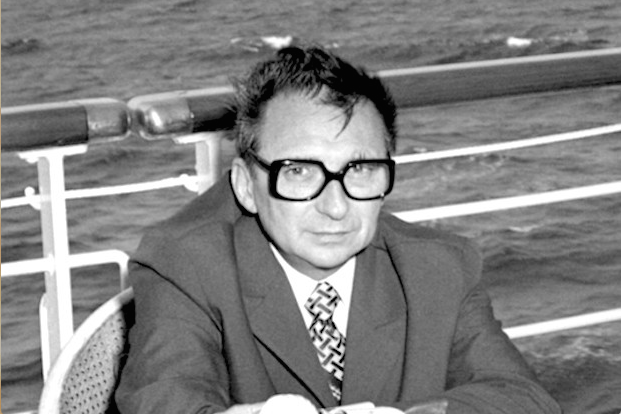The respected Catholic News Agency has published an interview with Ion Mihai Pacepa, a former general in Romania’s secret police who was one of the Eastern Bloc’s highest-ranking defectors in the 1970s. In it, he says that Soviet Union – and the KGB in particular – created liberation theology, the quasi-Marxist movement that flourished in Latin America from the 1960s to the 1990s and is still a powerful influence on the Catholic Left.
The interview provides fresh evidence of the infiltration of liberation theology by Russia – a subject Catholic liberals would much rather not discuss, just as they don’t want to know about the heavy Soviet investment in CND.
But first, some caveats. Pacepa, pictured above in specs that look as if they were designed by Dame Edna, is now well to the right of the American political spectrum. He’s not into nuance and he exaggerates. I don’t believe that the KGB ‘created’ a movement as complex as liberation theology and I’m far from convinced that its name was dreamt up in the Lubyanka.
But Pacepa – whose defection to the US in 1978 scared Ceausescu so badly that he reportedly tried to get Carlos the Jackal to kill him – makes detailed claims that the Soviets kick-started, funded and moulded liberation theology (some of whose priests, it must be conceded, worked heroically among the poor).
He cites as one of his sources Aleksandr Sakharovsky, the Russian agent who set up Romania’s secret police agency. Pacepa describes him as his ‘de facto boss’ in the 1950s. Sakharovsky later became head of the First Chief Directorate of the KGB.
Here are the key quotes from the interview:
The birth of Liberation Theology was the intent of a 1960 super-secret ‘Party-State Dezinformatsiya Programme’ approved by Aleksandr Shelepin, the chairman of the KGB, and by Politburo member Aleksey Kirichenko, who coordinated the Communist Party’s international policies. This programme demanded that the KGB take secret control of the World Council of Churches (WCC), based in Geneva, Switzerland, and use it as cover for converting Liberation Theology into a South American revolutionary tool …
The KGB began by building an intermediate international religious organization called the Christian Peace Conference (CPC), which was headquartered in Prague. Its main task was to bring the KGB-created Liberation Theology into the real world.
The new Christian Peace Conference was managed by the KGB and was subordinated to the venerable World Peace Council, another KGB creation, founded in 1949 and by then also headquartered in Prague …
During my years at the top of the Soviet bloc intelligence community I managed the Romanian operations of the World Peace Council (WPC). It was as purely KGB as it gets. Most of the WPC’s employees were undercover Soviet bloc intelligence officers … Even the money for the WPC budget came from Moscow, delivered by the KGB in the form of laundered cash dollars to hide their Soviet origin. In 1989, when the Soviet Union was on the verge of collapse, the WPC publicly admitted that 90 per cent of its money came from the KGB.
And now the bit that will really wind up Catholic liberals:
I was not involved in the creation of Liberation Theology per se. From Sakharovsky I learned, however, that in 1968 the KGB-created Christian Peace Conference, supported by the world-wide World Peace Council, was able to manoeuvre a group of leftist South American bishops into holding a Conference of Latin American Bishops at Medellin, Colombia. The Conference’s official task was to ameliorate poverty. Its undeclared goal was to recognise a new religious movement encouraging the poor to rebel against the ‘institutionalised violence of poverty’, and to recommend the new movement to the World Council of Churches for official approval.
The Medellin Conference achieved both goals. It also bought the KGB-born name ‘Liberation Theology’.
The Medellin conference is spoken of with hushed reverence by Christian liberals, Protestants as well as Catholics. Its ‘option for the poor’ was central to the thinking of Gustavo Gutiérrez, the Dominican theologian who has a far stronger claim to be the founder of liberation theology than the KGB.
But, to quote Mario Aguilar’s book Pope Francis: His Life and Thought, ‘Gutiérrez’s work certainly inspired numerous theological writings that used Marxism as a hermeneutical tool for exploring social realities’. This displeased Fr Jorge Bergoglio, who as Provincial Superior of the Argentinian Jesuits tried to stamp out the political excesses of liberation theologians. (As Pope he has spoken more warmly of the movement, but lefty South American Jesuits have long memories and many will never forgive him.)
It did please Moscow, however – especially as liberation theologians conspicuously failed to condemn the horrors of the Brezhnev era. And it would be naive to dismiss claims that the Soviet Union pumped money into the movement. Pacepa’s interview deserves impartial critical scrutiny. But I can’t see that happening, because it raises questions that are terribly embarrassing for Catholic liberals.







Comments